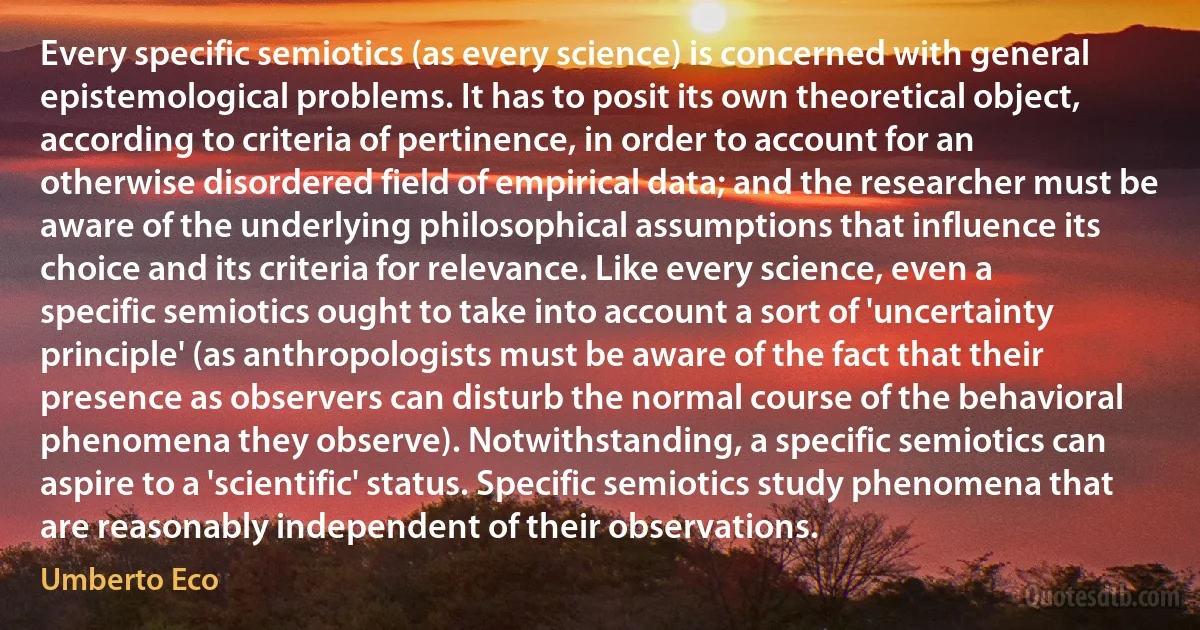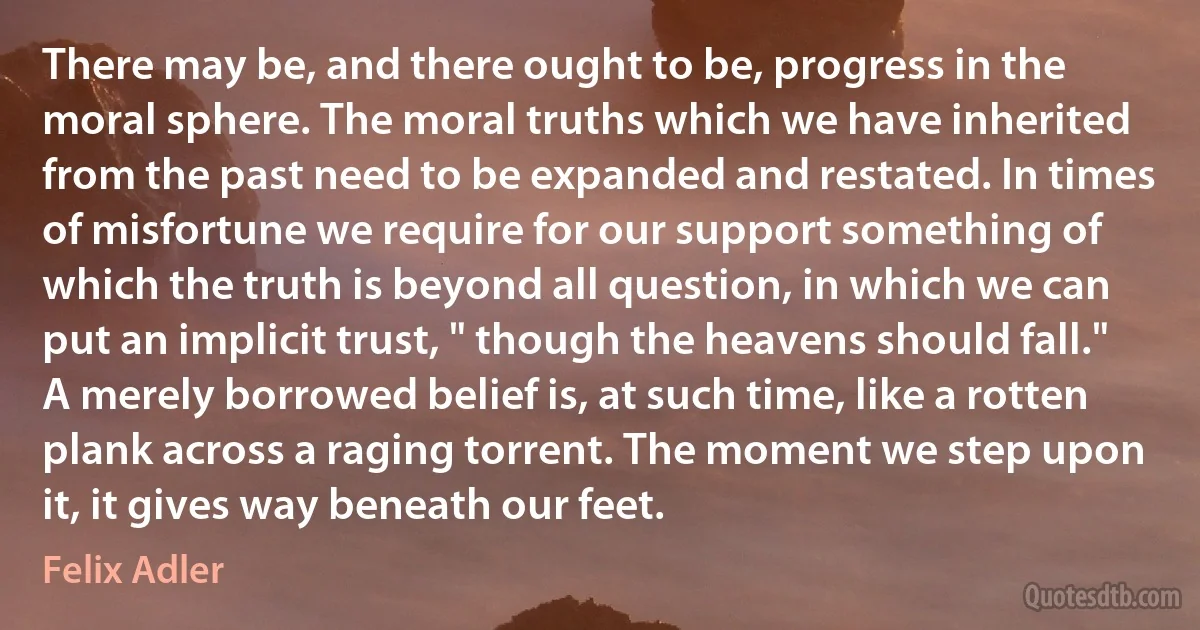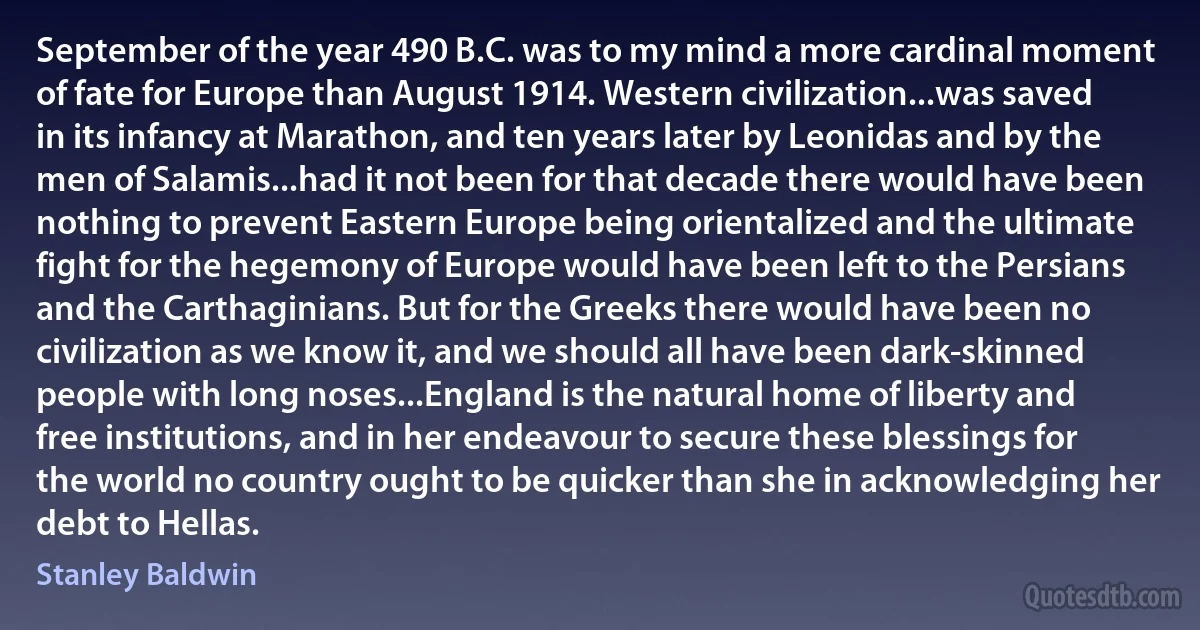Ought Quotes - page 98
Elitism is a typical aspect of any reactionary ideology, insofar as it is fundamentally aristocratic, and aristocratic and militaristic elitism cruelly implies contempt for the weak. Ur-Fascism can only advocate a popular elitism. Every citizen belongs to the best people of the world, the members of the party are the best among the citizens, every citizen can (or ought to) become a member of the party. But there cannot be patricians without plebeians. In fact, the Leader, knowing that his power was not delegated to him democratically but was conquered by force, also knows that his force is based upon the weakness of the masses; they are so weak as to need and deserve a ruler. Since the group is hierarchically organized (according to a military model), every subordinate leader despises his own underlings, and each of them despises his inferiors. This reinforces the sense of mass elitism.

Umberto Eco
We are the dominant power. And that imposes on us a responsibility to be actually concerned with the well being of the world. Because we set the agenda. And there are a lot of problems, including terrorism and weapons of mass destruction, that can only be tackled by collective action. And we ought to be leading that collective action, instead of riding roughshod over other people's opinions and interests.

George Soros
In each art the difficulty of the form is a substitution for the difficulty of direct apprehension and expression of the object. The first difficulty may be more or less overcome, but the second is insuperable; thus every poem begins, or ought to, by a disorderly retreat to defensible positions. Or, rather, by a perception of the hopelessness of direct combat, and a resort to the warfare of spells, effigies, and prophecies. The relation between the artist and reality is an oblique one, and indeed there is no good art which is not consciously oblique. If you respect the reality of the world, you know that you can approach that reality only by indirect means.

Richard Wilbur
As Charles Black stated in his highly regarded work on impeachment, the two specific impeachable offenses--treason and bribery--can help identify both the 'ordinary crimes which ought also to be looked upon as impeachable offenses, and those serious misdeeds, not ordinary crimes, which ought to be looked on as impeachable offenses..." Using treason and bribery as "the miners' canaries," Professor Black states that "high crimes and misdemeanors, in the constitutional sense, ought to be held to be those offenses which are rather obviously wrong, whether or not 'criminal,' and which so seriously threaten the order of political society as to make pestilent and dangerous the continuance in power of their perpetrator."

Ted Kennedy
Ah! there is a great task in front of us... Do you know what is in front of you? A bigger task than democracy has never yet undertaken in this land. You have got to free the land-to free the land that is to this very hour shackled with the chains of feudalism. We have got to free the people from anxieties, the worries, the terrors-terrors that they ought never to be called upon to face-terrors that their children may be crying for bread in this land of plenty. It is our shame. It is a disgrace to this the richest land under the sun that they should want-a contingency which no honest, thrifty man in this land should have to face.

David Lloyd George
If anything were required to convert me to the need for Scottish Home Rule, I think it was that solitary experience I had upon a Private Bill Committee... [P]urely local, and if I may say purely provincial questions ought to be delegated to purely provincial and-I am not afraid to use the word-national assemblies.

David Lloyd George
If it is a question of setting up an independent Irish Republic in this small group of islands, that is a thing we could only accept if we were absolutely beaten to the ground. We take the same view exactly of the position as President Lincoln took of the attempt of the Southern States to claim secession. There were men in this country who thought he ought to have recognised the Southern States. Lincoln, one of the greatest democratic figures who ever lived in the world, took a different view. History has justified Lincoln. I have met Southerners whose fathers fought and suffered for what they regarded as liberty, who now admit that Lincoln was right. Therefore it is no use my giving any hope that it is even possible to discuss any policy of reconciliation which involves the recognition of an independent Republic of Ireland.

David Lloyd George
It is said that I ought to have taken the risks and stopped the carnage. Let me confess that there were, and still are, moments when I am of the same opinion. But let those who are inclined to condemn me and the War Cabinet for not taking the hazard, weigh carefully and fairly the conditions at that time. Passchendaele could not have been stopped without dismissing Sir Douglas Haig. Sir William Robertson would have resigned. Had both disappeared without any preliminary fuss which would have rattled the Army, there would have been a sense of relief amongst all the fighting men from one end of the line to the other. But I could not have done it without the assent of the Cabinet.

David Lloyd George
Ah, shit on the people and what they want and what they're ready for! I don't give a goddamn about the people and what they want! This is the face of someone who has fought long and hard for the good of the people without caring much for any of ‘em. And I look a lot worse without the wig. The people elected me! To represent them! To lead them! And I lead! You ought to try it!

Thaddeus Stevens
Throughout the civilised world the teachings of Marx evoke the utmost hostility and hatred of all bourgeois science (both official and liberal), which regards Marxism as a kind of "pernicious sect”. And no other attitude is to be expected, for there can be no "impartial” social science in a society based on class struggle. In one way or another, all official and liberal science defends wage-slavery, whereas Marxism has declared relentless war on that slavery. To expect science to be impartial in a wage-slave society is as foolishly naïve as to expect impartiality from manufacturers on the question of whether workers' wages ought not to be increased by decreasing the profits of capital.

Vladimir Lenin
Same with religion. Religion is nothing but mind control. Religion is just trying to control your mind, control your thoughts, so they're gonna tell you some things you shouldn't say because they're...sins. And besides telling you things you shouldn't say, religion is gonna suggest some things that you ought to be saying; "Here's something you ought to say first thing when you wake up in the morning; here's something you ought to say just before you go to sleep at night; here's something we always say on the third Wednesday in April after the first full moon in spring at 4 o'clock when the bells ring." Religion is always suggesting things you ought to be saying.

George Carlin
It is the mark of a good action that it appears inevitable in the retrospect. We should have been cut-throats to do otherwise. And there's an end. We ought to know distinctly that we are damned for what we do wrong; but when we have done right, we have only been gentlemen, after all. There is nothing to make a work about.

Robert Louis Stevenson
I confess, that on the general subject my views have in the course of twenty years undergone a great alteration. I used to be of opinion that corn was an exception to the general rules of political economy: but observation and experience have convinced me that we ought to abstain from all interference with the supply of food. Neither a government nor a legislature can ever regulate the corn market with the beneficial effects which the entire freedom of sale and purchase are sure of themselves to produce.

John Russell, 1st Earl Russell
Christ is the ideal of what a man should be. He has my ideal portrait, as it were, drawn out in His own thought and feeling. There is an exaltation and a grandeur for myself in the time to come, which Christ knows, and I do not; but I am following after. I am pressing up toward that thought that Christ has of what I am and ought to be; and I am determined that I will apprehend it as Christ Himself does. Not that I have it; but I will strive for it. My manhood is in the future. My life lies beyond the present.

Henry Ward Beecher
We ought to recognize that uncertainty of mind is not all a bad thing. It is a sign that your mind is still alive, still sensitive. If you are not at all confused in this day you are dead mentally and spiritually.
There is of course the peace of the cemetery. If you want that you can have it. But you will pay for such complacent serenity with blind eyes which do not see the world's fear and agony; with deaf ears, into which the still sad music of humanity never comes; with deadened nerves and unsensitized conscience.
We will never be brought to confusion, even in such a baffling and muddled world as ours, if we have a faith in a God of love as the ultimate power in the universe. The words "God is love" have this deep meaning: that everything that is against love is ultimately doomed and damned.

Halford E. Luccock
So I hope that I did as I ought, but I do not trust myself as long as I am in this mortal body, for he is strong who strives daily to turn me away from the faith and true holiness to which I aspire until the end of my life for Christ my Lord, but the hostile flesh is always dragging one down to death, that is, to unlawful attractions. And I know in part why I did not lead a perfect life like other believers, but I confess to my Lord and do not blush in his sight, because I am not lying; from the time when I came to know him in my youth, the love of God and fear of him increased in me, and right up until now, by God's favour, I have kept the faith.

Saint Patrick
Since my interview with you on the 18th I have felt that I ought not longer retain my commission in the Army ... It would have been presented at once, but for the struggle, it has cost me to separate myself from a service to which I have devoted all the best years of my life, and all the ability I possessed ... I shall carry with me to the grave the most grateful recollections of your kind consideration and your name and fame will always be dear to me. Save for defense of my native state, I never desire again to draw my sword.

Robert E. Lee
The science of government being, therefore, so practical in itself, and intended for such practical purposes, a matter which requires experience, and even more experience than any person can gain in his whole life, however sagacious and observing he may be, it is with infinite caution that any man ought to venture upon pulling down an edifice which has answered in any tolerable degree for ages the common purposes of society, or on building it up again without having models and patterns of approved utility before his eyes.

Edmund Burke
We are here preparing, as I see it, this international armaments conference. That ought to be our project. If we can remove the obstacles in the way of that we shall have done a tremendous amount of work that, in its very nature, once it is done, is bound to be permanent, because the reason and morality of the world will stand by it so loyally.

Ramsay MacDonald
It is, I think, a mistake to treat the annual Budget as if it were a thing by itself, and not, as it is, or as it certainly ought to be, an integral part and a necessary link in a connected and coherent chain of policy. In my opinion...the country has reached a stage in which, whether we look merely at its fiscal or at its social exigencies, we cannot afford to drift along the stream and treat each year's finance as if it were self-contained. The Chancellor of the Exchequer, in other words, ought to Budget, not for one year, but for several years.

H. H. Asquith
Life complete, is lived in two worlds; the one inside, and the one outside. The first half of our days is spent wholly in the former; the second, if it is what it ought to be, wholly in the latter - till our education is almost finished; theories are only words to us, and church controversy is not of things but of shadows of things. Through all that time life and thought beyond our own experience is but a great game played out by book actors; we do not think, we only think we think, and we have been too busy in our own line to have a notion really of what is beyond it. But while so much of our talk is so unreal, our own selves, our own risings, fallings, aspirings, resolutions, misgivings, these are real enough to us; these are our hidden life, our sanctuary of our own mysteries.

James Anthony Froude
From the German point of view the monstrous problem thus set must inevitably be solved by the apotheosis of the German peoples. In the meantime, far from ‘German culture' seeming disposed to reform itself, we hear it proclaiming louder than ever a universal right to supreme domination, which confers on it the right of life and death over the nations, to be asserted and enforced by all possible means. Ought we not all to feel menaced in our very vitals by this mad doctrine of universal Germanic supremacy over England, France, America, and every other country?

Georges Clemenceau



